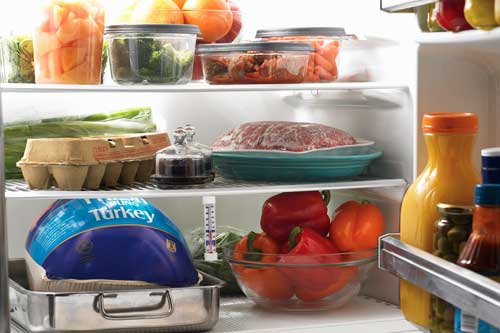Cross-posted from the FoodSafety.gov blog.
What would Thanksgiving be without the turkey? Most of us plan our entire holiday dinner around the turkey. That’s a lot of pressure on one bird!
Here’s what you need to know when you go to the store to buy your holiday turkey.
Choosing Your Turkey
- Fresh or frozen? Buy a frozen turkey if you want to buy it well in advance of your meal, keep it frozen until you’re ready to thaw it. Turkeys can be kept frozen in the freezer indefinitely; however, cook within 1 year for best quality. Remember to allow time for thawing (see the Turkey Thawing Chart for details). Once thawed it is safe for two more days. Buy a fresh turkey no more than two days before cooking.
- Size? When selecting your turkey, allow 1 pound of turkey per person for fresh or frozen, 1¼ pound per person for frozen pre-stuffed.
- Hen or tom? Don’t worry about it! The designation of "hen" (female) or "tom" (male) turkey is optional on the label and is an indication of size. Toms are larger but both toms and hens should be equally tender. Turkeys of either sex that are less than 8 months of age are considered "young" turkeys.
- Do not buy fresh pre-stuffed turkeys. If not handled properly, any harmful bacteria that may be in the stuffing can multiply very quickly.
At the Store
- Select cold food last. Pick up the turkey and other perishable food items at the end of your shopping trip to ensure that they stay refrigerated until right before checkout.
- Read the label. Don’t buy food that is past the “Sell-by,” “Use-By,” or other expiration dates
- Check the packaging. Never choose a turkey with packaging that is torn or leaking. Make sure frozen food is frozen solid and refrigerated food feels cold.
- Separate foods in your grocery cart. Keep raw meat, like a turkey, away from other food to prevent the possibility of cross-contamination. Keep them separated during checkout and in your grocery bags, too.
At Home
Whey you arrive home after shopping for your holiday meal, you will probably have lots of bags to unload. Be sure to unload all of your groceries right away. This time of year, the USDA Meat and Poultry Hotline gets lot of questions about whether a turkey left in the trunk of the car overnight is safe (it’s not!). As always, as soon as you get the groceries inside, refrigerate or freeze all perishables – including the turkey.
For more information on turkeys, check out these resources on FoodSafety.gov:
If you have any questions about turkeys and Thanksgiving, feel free to contact us at the Hotline (1-888-674-6854 toll-free) or online at AskKaren.gov.

